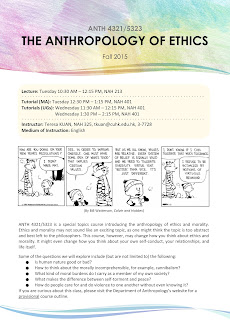Death
appears to be the ultimate threat to our lives and senses of security. People
in different parts of the world, with different religions and local beliefs,
offer diverse depictions of an afterlife. On July 2, the Hong Kong Anthropological
Society had invited Allie Kwong, an MPhil student of our department, to give a
talk on “Is Death the End? Senses of Life after Death in Guangdong”. Allie has
been doing research on the topic and had interviewed people in Guangdong to see
how they envisioned their lives after death, in what contexts their imaginations
were situated, and how their senses of life after death related to their
understanding of life.
 |
| Allie presenting her research at the Hong Kong Museum of History |
Allie’s
informants included believers, agnostics and non-believers of life
after death. Use of specific terms and concepts by non-believers revealed the
forces that shaped their non-belief. These forces included the materialist and
atheist education in the socialist era, the celebration of science and
hierarchy created between science and “superstition”. Beliefs in life after
death was considered and “superstition” by many. It was associated with the
rural population and negative traits such as being “uncultured” and
“uneducated”. For the believers of an afterlife, rather than adhering to a single
doctrine, they constructed their own version of life after death by selecting
different themes from available resources. Allie identified two conditions that
encouraged such process of personalization and privatization. First, the
religious policy in the reform era created a hierarchical plurality in the
religious field. A diversity of religious views have been allowed for choice in
contemporary China. Second, the stigma that supernatural beliefs continued to
carry contributed to the privatization of beliefs in life after death.
Allie
argued that there are relationships between senses of life after death and how
individuals understand or lives their life. First, senses of life after death
influences individuals’ lives. Beliefs in reincarnation, paradise and hell, and
heaven and hell provided believers moral guidance and motivated believers to
perform good deeds, while beliefs in spirits inflicted emotions and influenced
decision making of the believers by supernatural agents’ direct participation
in believers’ life. Non-believers spoke of the moral freedom that non-belief
granted, which allowed them to be more “practical” and “flexible”. Second,
individuals’ senses of life after death may be a reflection of their emotional
bonding with the deceased. In turn, the imagination/belief of afterlife or its
absence help them make sense of their feelings towards the deceased, how they
should position themselves in the relationship and how they should proceed with
life. Finally, senses of life after death becomes a means through which people
imagine a better China, one that is morally regulated as they feel that today
is not.. A number of interviewees, believers and non-believers believed that if
more people in China believed in reincarnation or heaven and hell, China would
become a better place. Allie argued that this statement, unsupported
empirically, had to be understood as a response to the “moral vacuum” resulted
from the end of a single dominant code of ethics and the emergence of
heterogeneous values since the fall of the communist ideal.
Around
40 people attended the talk and audience showed great interest in the topic. They
raised questions about symbolic immortality through descendants and nationalism,
the differences between Guangzhou and Hong Kong people in their attitudes
towards life after death, the social and economic pattern of believers and
non-believers, and how the research influences the researcher in return. The
discussion was lively and engaging. In short, Allie’s
talk addressed the deepest fears of individuals in Guangdong and discussed how
societal values and individuals’ senses of lives influenced each other. Individuals’
imaginations reflected their pursuits in life, their attitude to life, and the
social values they internalized.





